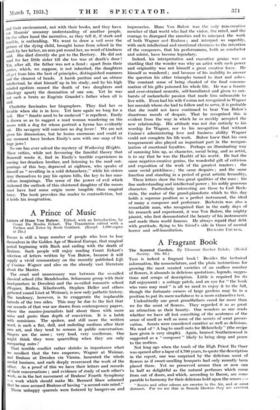A Prince of Music Letters of Hans Von Bulow. Edited,
with an Introduction, by Count Du Moulin Eckert. The Translation edited with a Preface and Notes by Scott Goddard. (Knopf. 1,000 copies at 218.) THERE is still a large number of people who love to lose themselves in the Golden Age of Musical Europe, that magical
period beginning with Bach and ending with the death of Brahms. Such people will enjoy reading Count Eckart's
selection of letters written by Von Bulow, because it will supply a vivid commentary on the recently published Life of Cosima Wagner and also on the already vast literature
about the Master.
The cruel and unnecessary war between the so-called classical school (the Mendelssohn, Schumann group with their headquarters in Dresden) and the so-called romantic school (Wagner, Berlioz, Klindworth, Stephen Heller and others gathered round Liszt at Weimar), is now only pathetic history. The tendency, however, is to exaggerate the implacable hatreds of the two sides. This may be due to the fact that our records of that war are drawn from contemporary papers, where the musico-journalists laid about them with more
noise and gusto than depth of conviction. It is a habit with musicians. The spoken, and still more the written word, is such a flat, dull, and unfeeling medium after their own art, and they tend to scream in public conversation. Singers are the same ; very loud, very vociferous. One might think they were quarrelling when they are only comparing notes !
That terrible conflict rather shrinks in importance when we recollect that the two emperors, Wagner at Weimar, and Brahms at Dresden via Vienna, lamented the whole sordid business, and each deeply reverenced the work of the other. As a proof of this we have their letters and records of their conversations ; and evidence of study of each other's work, as in the last movement of Brahms' Fourth Symphony —a work which should make Mr. Bernard Shaw ashamed that he once accused Brahms of having " a second-rate mind."
Those unhappy quarrels were fostered by hangers-on and impresarios. Hans Von Bulow was the only non-creative member of that world who had the vision, the mind, and the courage to disregard the enmities and to interpret the work of both Wagner and Braluas ; and interpret so superbly, with such intellectual and emotional closeness to the intention of the composers, that his performances, both as conductor and soloist, have become legendary.
Indeed, his interpretative and executive genius was so startling that the wonder was why an artist with such power and originality was not himself a great creative force. He himself so wondered ; and because of his inability to answer the question his other triumphs turned to dust and ashes. The constant sense of being cheated of the final consum- mation of his gifts poisoned his whole life. He was a frantic and over-strained neurotic, self-humiliated and given to out- bursts of melancholic passion that made him unbearable to live with. Even had his wife Cosima not recognized in Wagner her messiah whom she had to follow and to serve, it is probable that she could not have continued to bear Von Bulow's disastrous moods of despair. That he recognized this is evident from the way in which he so meekly accepted the new relationship. His attitude was not due entirely to his worship for Wagner, nor to his recognition that without Cosima's administering love and business ability Wagner could not complete his life work. Bulow knew that his own temperament also played an important part in the reorgan- ization of emotional loyalties. Perhaps an illuminating way of summing him up, as character, social being, and as artist, is to say that he was the Hazlitt of his world. He had the same negative-creative genius, the wonderful gift of criticism and exposition of the work of the greatest masters ; the same social prickliness ; the same despairs ; and the same function and standing in a period of great artistic fecundity.
These letters show the two great qualities of the man : his fine understanding and intellectual power ; his nobly generous character. Particularly interesting are those to Carl Bech- stein, the maker of the grand-pianoforte which to this day holds a supreme position as a perfect instrument, the ideal of many a composer and performer. Bechstein was also a remarkable man, who recognized that in the early days of his research and experiment, it was Von Bulow, the mighty pianist, who first demonstrated the beauty of his instruments and made them world famous. He always repaid that debt with gratitude, flying to his friend's side in times of mental


























































 Previous page
Previous page